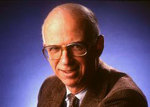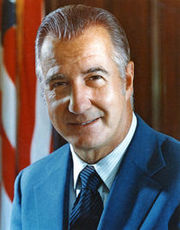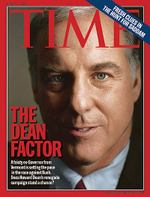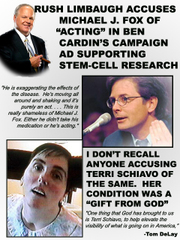Politics may be the most misunderstood word in the American language.
This is deliberate, part of the fall-out from the Nixon Thesis of Conflict. (Its original pitchman, Spiro Agnew, is shown at right.)
When President Bush or any conservative uses the word, it’s usually in the past dismissive tense. Congress is "playing politics" with Alberto Gonzalez, or the war in Iraq, or immigration. The idea is that politics is, per se, a bad thing, and that if we can just set politics aside we’ll all do what’s best for the country, namely what the person pushing the accusation of politicswants done.
When Democrats use the word, it’s usually to connote discussion of some policy they find important. The Bush criticisms, in this sense, are true. Democrats use the word politics to describe any dissent from a policy they don’t like. Republicans don’t like the dissenting point, hence it’s politics, hence bad.
Because "official Washington" is so overwhelmingly Republican — everyone there believes in the Nixon Thesis, they assume its truth (even if they lean against it), they feel its power (even if they oppose it) — this definition of the word politics is internalized. I think this is really at the he
In this definition key questions, like war, are supposed to be taken out of politics. Elites are supposed to find common ground, no matter what they tell the voters, so the country can move forward. The "real" political spectrum extends from the Democratic Leadership Council on the left to Richard Viguerie on the right.
This is not entirely irrational. There have been only two Democratic
Presidents in the last 40 years. Both of them ran to the right of their
party to gain nomination. Bill Clinton, who ruled to the right of his
party (the "Third Way"), was somewhat successful. Jimmy Carter, who
eventually embraced (and came to embody) liberal values in the Nixon-Reagan
Era, was beaten soundly. Every other President, since 1968, has been a
Republican, a self-styled conservative Republican. Thus the "Third Way"
becomes the practical definition of liberal (it’s what has won), while
anything on the right becomes a practical definition of conservative
(since that’s what usually wins).
The whole concept of the Netroots, the whole idea behind the Dean
campaign, is that "the Democratic wing of the Democratic Party" is the
majority view of the party, and that this wing can indeed take power,
by confronting the Nixon Thesis (Edwards), or by ignoring it in favor
of something new (Obama). To many Democrats, Hillary Clinton is the
right-winger in their race. To conservatives, she’s the face of the
left.
But there is a far more important definition of the word politics.
It is the unwritten definition, the working definition of both those in
power and those who support them.
Everything is politics.
- Sports is politics. Which sports you prefer, how you view
the participants, even who you root for, these are all political
decisions by which others judge you. - Entertainment is politics. The content of movies is
politics. The money flows are politics. The views of those in the
industry are politics. Our view of what constitutes entertainment is
politics. - Education is politics. What we teach, how we teach it, these are all political questions, defined politically in both the public and private sphere.
- Science is politics. Science is subject to political argument, and political tests.
- Lifestyle is politics. Not just your sex life, but everything about how you live your life is politics. What you drive is politics, where you live is politics.
- Religion is politics. This goes far beyond the idea that
religious ideals may fuel your political view. Religion is supposed to
define your political view, not just generally but in every particular. - Business is politics. Not just in obvious ways, or in terms of government contracts, but in terms of policies that should be non-political.
- Journalism is politics. What’s defined as news, and how that news is reported, is intensely political, and nothing but political.
- Justice is politics. Who we prosecute, and whether they are convicted, is inherently political. Law is just politics by other means. Legal decisions are all subject to political tests.
- Politics is war. No, not war is politics. But politics itself is a form of warfare. And all’s fair in war.
This hidden, false definition of politics has kept most people,
throughout this decade, from seeing through to the dirty heart of the
Bush Administration. Somehow good will was assumed, to institutions
which the Bush people (and their supporters) held in nothing but
contempt.
The definition of politics is politics.
This has been the secret heart of our political life under the Nixon
Thesis of conflict for nearly 40 years. Everything is a zero-sum game,
friends to be benefited, enemies to be destroyed. There is no place
"outside" politics — music, film, TV, business, a game, the classroom, a science
experiment — nothing. Everything can be politically argued, decided
politically, defined politically.
So long as people who believe this are able
to gain adherents, not just a majority (as they have these 40 years)
but any significant minority, it is this definition of politics we
should assume to be true, and this definition of politics that liberals
better get their heads around if they ever want to overcome the Nixon Thesis.
In fact, the greatest triumph of the Netroots is just this. Not the
people it’s elected, or the money it’s raised. People who get a steady
diet of Netroot bloggers are also getting this message drilled into
them, sometimes openly, other times subliminally. Everything is
politics, so in everything you do get in their face, recognize your
enemies, and be ready to rumble.
That’s how they roll, and that’s how we must if we’re to take our country back.














Great observations on the frame Dana. The war of words purveyed by the GOP since Nixon is legendary. The collusion between political policy and marketing techniques has cultivated the true “closing of the American mind.” I’m often overwhelmed by the realization of how effective the dumbing down of Americans has been. At least the The Roman Empire lasted longer than 130 years. God help us all. Thanks for your great piece.
Great observations on the frame Dana. The war of words purveyed by the GOP since Nixon is legendary. The collusion between political policy and marketing techniques has cultivated the true “closing of the American mind.” I’m often overwhelmed by the realization of how effective the dumbing down of Americans has been. At least the The Roman Empire lasted longer than 130 years. God help us all. Thanks for your great piece.
Comments on an article you wrote.
Nearly all our great breakthroughs came with the help of immigrants. Hungry, poor, and huddled masses brought with them a willingness to work hard and justify their experience here. Whether these immigrants came from Europe or Asia, they all renounced their old allegiances and embraced our academic liberty as the tonic it was.
It’s not that we’re closing our doors to immigrants today. We’re not. But we’re no longer succeeding in attracting those with world-changing potential.
That’s due in part to our rejection of academic freedom.
-Now while I agree with the first part the second part is really not the defining factor in our national dilemma. It is not that we are not attracting the best, it is that we are consistently attracting the worst, from the slums, ghettoes, and third-world parts of the globe. We are attracting far more bad than good. We are attracting not scientists and engineers but criminals and fools who wish to exploit our success. When you talk about failings and lagging scientific achievements look first at the demographics that have created these calculable phenomena. The native population in the underfunded south and certain other rural areas, may be struggling to keep up with Northern Europe for a variety of reasons but their not failing completely according to the statistics. The uneducated hick is such a perverse media distortion that one can no longer afford to be skeptical of the agenda of these media conglomerates. Sure, they are uneducated, ignorant bible thumpers but when it comes to our national failings we should talk more about Detroit than Branson. Those areas of the country have always been there, but cities filled with third world immigrants have not. The underrepresentation in areas of science and actual logic and reason in centers of higher learning, is staggering in certain privileged minorities who can no longer be criticized. The left once stood for academic freedom. It is now a relic of its former self, in many ways no better than the religious right. It enforces an orthodoxy and has hopelessly enslaved a generation of people to failed marxist and ideological fictions. It has tethered the hope of our country to these lies that are soon to go under, lost to the annals of history, and we are sinking with them, being sucked down by these dangerous fictions.
Comments on an article you wrote.
Nearly all our great breakthroughs came with the help of immigrants. Hungry, poor, and huddled masses brought with them a willingness to work hard and justify their experience here. Whether these immigrants came from Europe or Asia, they all renounced their old allegiances and embraced our academic liberty as the tonic it was.
It’s not that we’re closing our doors to immigrants today. We’re not. But we’re no longer succeeding in attracting those with world-changing potential.
That’s due in part to our rejection of academic freedom.
-Now while I agree with the first part the second part is really not the defining factor in our national dilemma. It is not that we are not attracting the best, it is that we are consistently attracting the worst, from the slums, ghettoes, and third-world parts of the globe. We are attracting far more bad than good. We are attracting not scientists and engineers but criminals and fools who wish to exploit our success. When you talk about failings and lagging scientific achievements look first at the demographics that have created these calculable phenomena. The native population in the underfunded south and certain other rural areas, may be struggling to keep up with Northern Europe for a variety of reasons but their not failing completely according to the statistics. The uneducated hick is such a perverse media distortion that one can no longer afford to be skeptical of the agenda of these media conglomerates. Sure, they are uneducated, ignorant bible thumpers but when it comes to our national failings we should talk more about Detroit than Branson. Those areas of the country have always been there, but cities filled with third world immigrants have not. The underrepresentation in areas of science and actual logic and reason in centers of higher learning, is staggering in certain privileged minorities who can no longer be criticized. The left once stood for academic freedom. It is now a relic of its former self, in many ways no better than the religious right. It enforces an orthodoxy and has hopelessly enslaved a generation of people to failed marxist and ideological fictions. It has tethered the hope of our country to these lies that are soon to go under, lost to the annals of history, and we are sinking with them, being sucked down by these dangerous fictions.